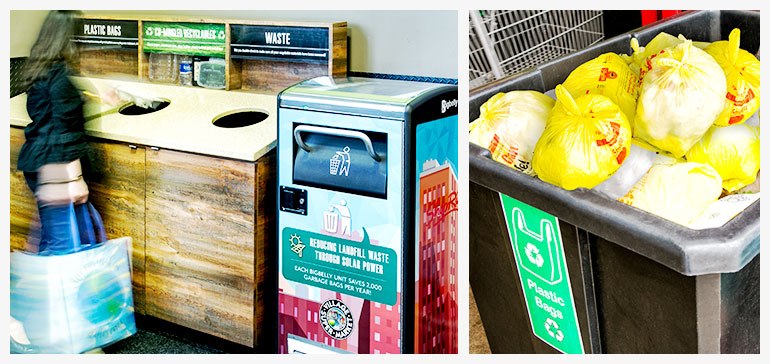Green Lights (And Doors… And Cases)
Join us as we take you on an environmental tour of our ShopRite stores.
When you arrive at your favorite ShopRite, you’ll see ways the store is working to reduce its environmental impact before you even set foot inside it. Plastic bag recycling bins are located near the front door. And at ShopRite of Greater Morristown there’s even a Tesla car charging station in the parking lot, where you can plug in your electric car while you shop.
But ShopRite is also working hard behind the scenes to save energy and reduce waste. Join us for an environmental sustainability tour of some of the technologies and practices ShopRite stores have adopted that are making a big difference, but aren’t so easy to spot.
Two of the biggest changes ShopRite has made are above your head. Over the past decade, ShopRite stores have transitioned from fluorescent bulbs to more energy-efficient bulbs, especially light-emitting diodes (LEDs). Some ShopRites in New Jersey have also installed rooftop solar panels. In fact, the panels at the ShopRite of Greenwich in Warren County generate as much as 12 percent of the store’s energy, the equivalent of planting 6,210 trees.
 Another sustainability measure is easy to see, but you might not realize its benefits. You’ve probably noticed the doors on the cases in the frozen department. But did you know they help save energy? They do, and that’s why ShopRite has been adding them to the dairy section. Plus, there are upgraded cases in both departments featuring LED lighting.
Another sustainability measure is easy to see, but you might not realize its benefits. You’ve probably noticed the doors on the cases in the frozen department. But did you know they help save energy? They do, and that’s why ShopRite has been adding them to the dairy section. Plus, there are upgraded cases in both departments featuring LED lighting.
Every ShopRite recycles. Stores ship their recyclables to a materials recycling facility that handles everything from paper and metal to wooden crates and cardboard. In the back section of stores, ShopRite collects food scraps and waste, composting material that would otherwise be sent to local landfills. Stores also donate fresh food that’s still good, but no longer perfect, to help local organizations that feed the hungry.
 Stores also carry sustainable products, including locally grown produce and sustainable seafood certified by either the Marine Stewardship Council (for wild-caught seafood) or the Global Aquaculture Alliance (for farmed seafood). And ShopRite recently implemented new standards designed to make the packaging for private-label products more recyclable and efficient. As a result, the packaging itself will be more sustainable and so will product transportation. Stores are working to reduce package weight, which would allow trucks to transport the same amount of product while using less fuel.
Stores also carry sustainable products, including locally grown produce and sustainable seafood certified by either the Marine Stewardship Council (for wild-caught seafood) or the Global Aquaculture Alliance (for farmed seafood). And ShopRite recently implemented new standards designed to make the packaging for private-label products more recyclable and efficient. As a result, the packaging itself will be more sustainable and so will product transportation. Stores are working to reduce package weight, which would allow trucks to transport the same amount of product while using less fuel.
But conservation efforts aren’t limited to packaging. ShopRite stores have also installed low-flow water fixtures and are using more efficient landscaping equipment to cut down on water consumption.
 Many associates join green teams, which identify and implement ways to make each store more sustainable. And several ShopRites have achieved Grocery Stewardship Certification (GSC), a data-driven program that engages associates to reduce grocery stores’ environmental impact and costs. The results are significant. Five GSC-certified ShopRites in New Jersey alone are reducing food waste by 350 tons and water use by 650,000 gallons of water every year. That translates into savings of more than $440,000 for those stores.
Many associates join green teams, which identify and implement ways to make each store more sustainable. And several ShopRites have achieved Grocery Stewardship Certification (GSC), a data-driven program that engages associates to reduce grocery stores’ environmental impact and costs. The results are significant. Five GSC-certified ShopRites in New Jersey alone are reducing food waste by 350 tons and water use by 650,000 gallons of water every year. That translates into savings of more than $440,000 for those stores.
These are just a few of ShopRite’s sustainability efforts. The next time you’re at your local ShopRite, you can help the environment by bringing your reusable bag or recycling your bag from your previous visit.

